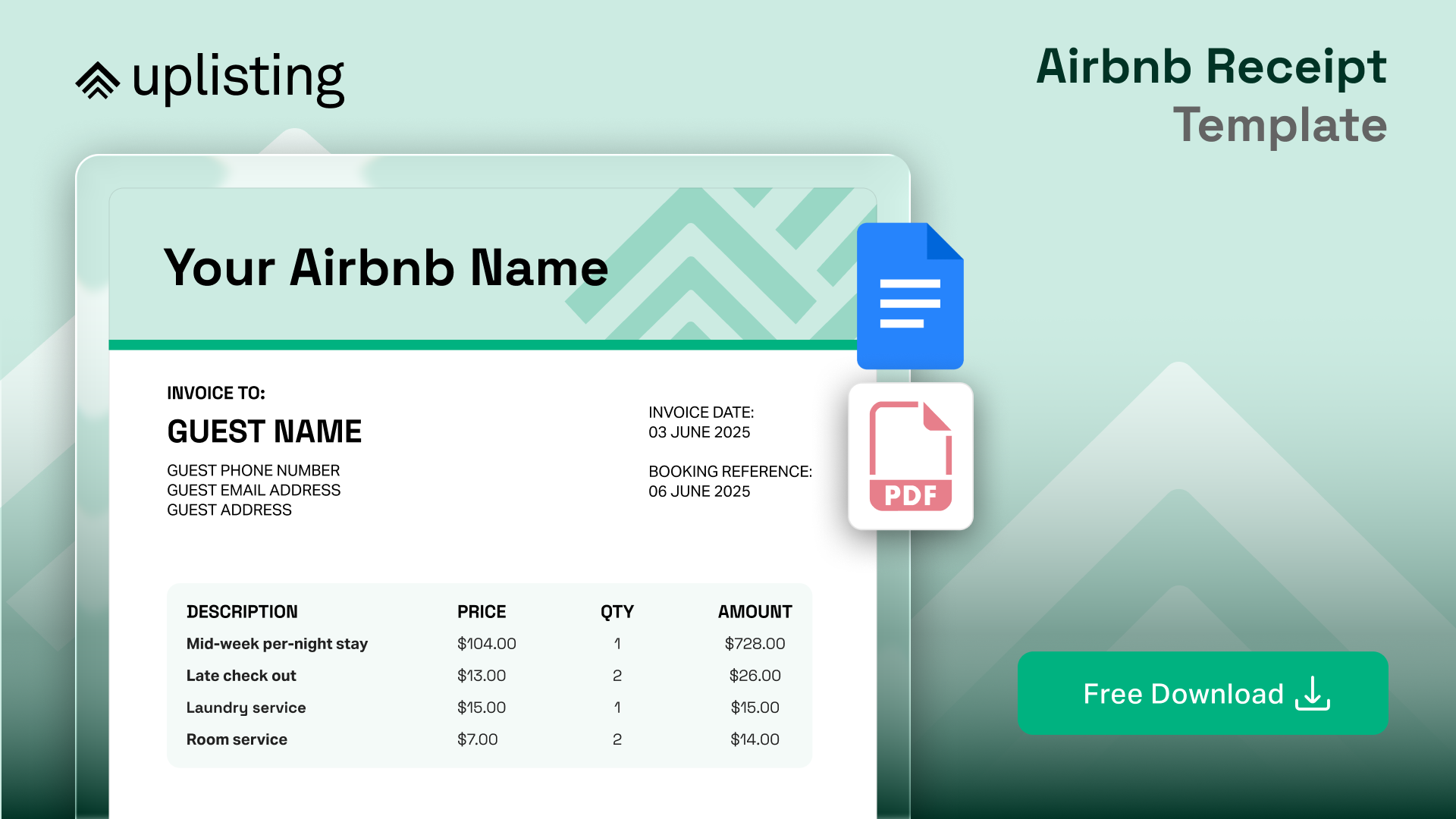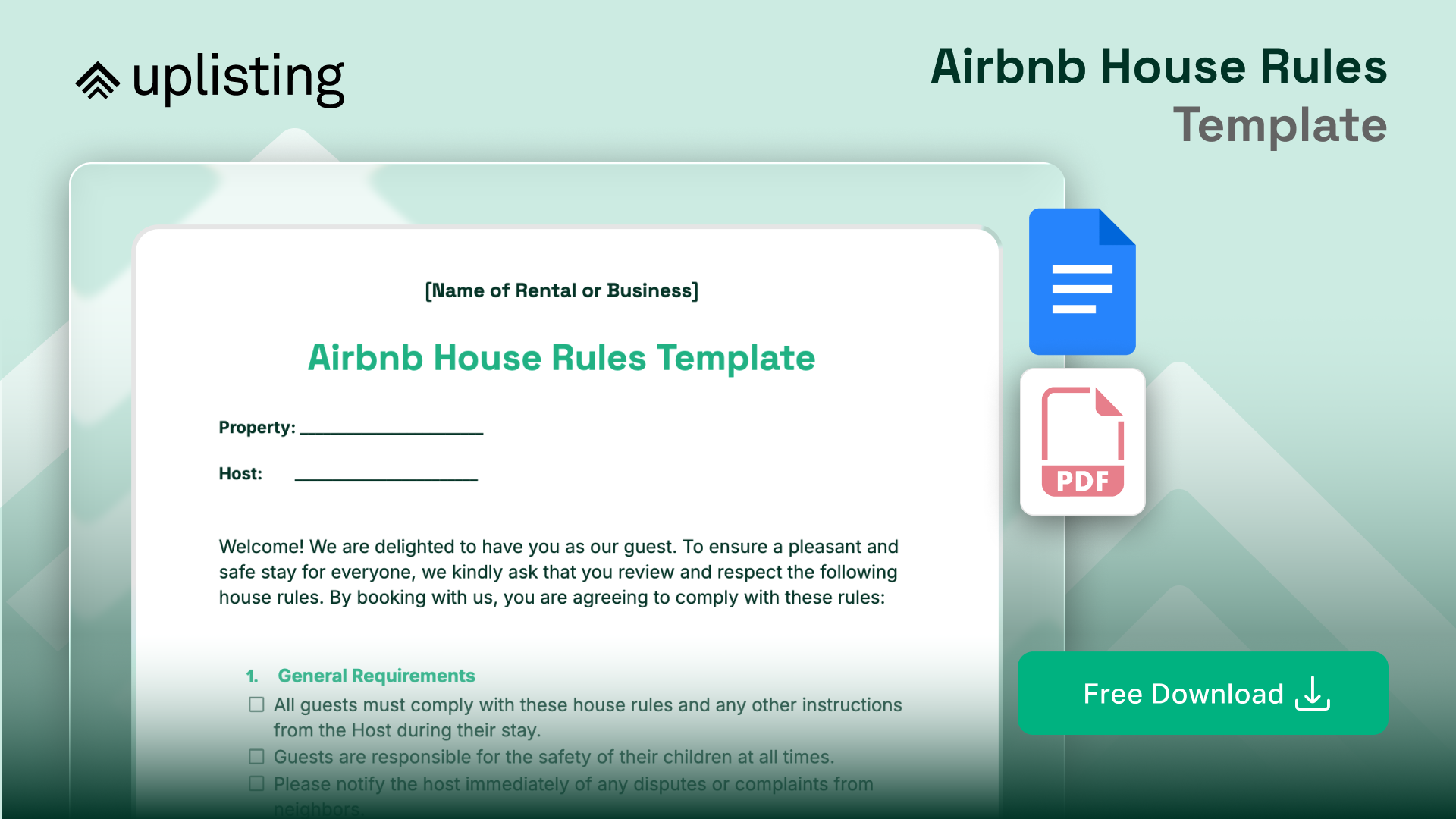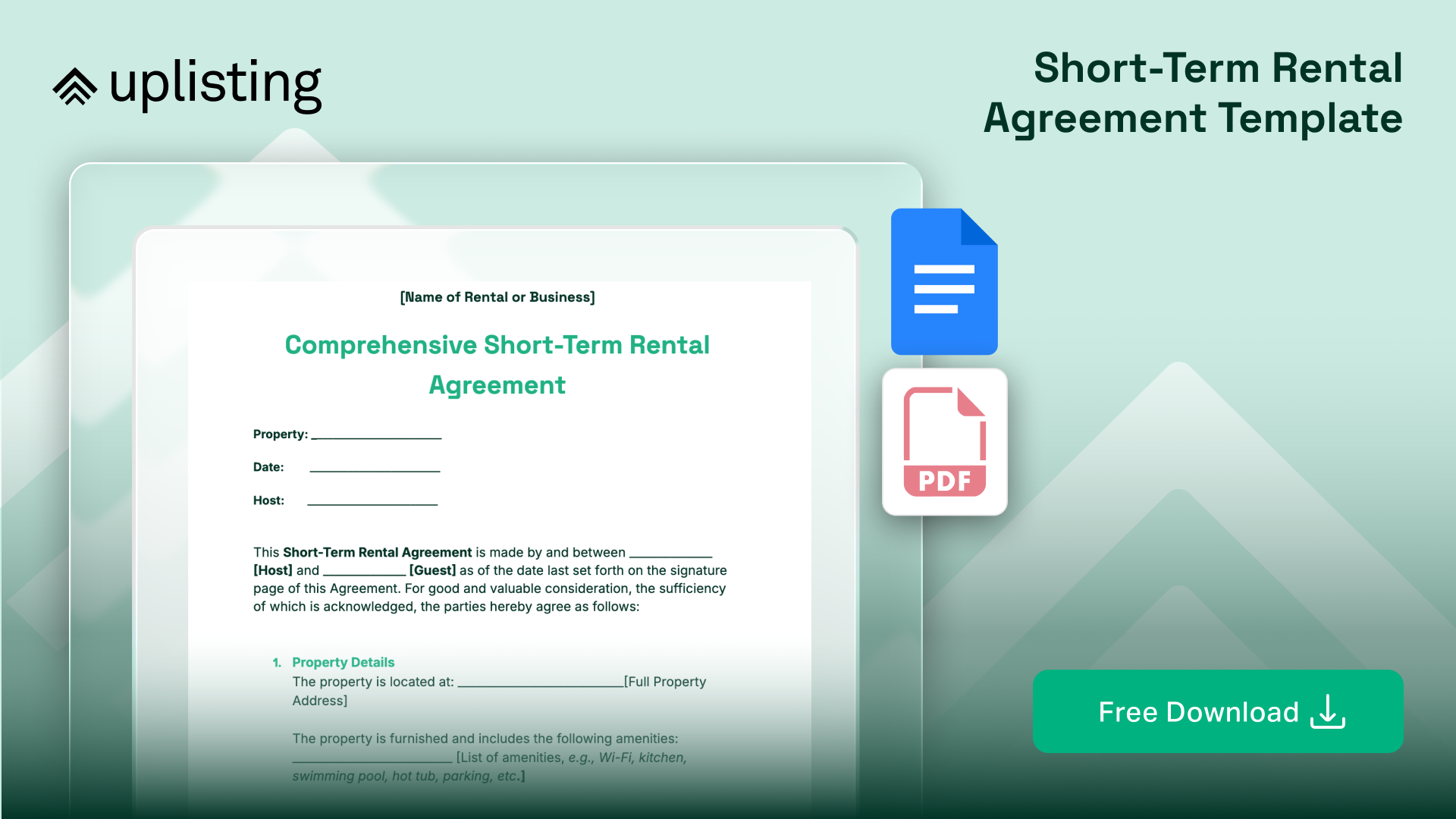Key Takeaways
Reviews are a key focus for Airbnb hosts, and they impact everything from guest trust to where your listing ranks on the platform.
Preempt great reviews by automating messages and setting expectations upfront, delivering excellent guest experiences from day one.
Dispute or remove reviews that violate guidelines to protect your hosting profile.
Every new host feels the pressure of reviews. One negative comment can drop your listing in the search results, while a streak of five-stars brings in better guests and higher nightly rates.
The Airbnb review policy shapes how you collect feedback, respond to issues, and manage your reputation, so understanding the rules gives you an edge.
This guide walks you through what really matters: how the review system works, what you can control, and the right way to handle unfair feedback.
The Importance of Reviews for Airbnb Hosts
Reviews shape your future as a host.
The Airbnb review policy directly affects how your listings show up in search; recent, strong reviews push you higher, while weak feedback bumps you down the list. Airbnb’s system rewards hosts who consistently earn high marks, so every five-star stay helps you stay visible and competitive.
Superhost status depends on more than just good intentions. Airbnb tracks star ratings, response times, and cancellations with precision. When you deliver what you promise and guests share positive feedback, you get closer to earning the Superhost badge. That badge attracts travelers who want a reliable experience. A dip in ratings or negative feedback can set you back for months, making consistency your best friend.
Strong reviews also lay the groundwork for guest trust. Travelers read guest experiences looking for details (cleanliness, accuracy, communication) before they hit the book button. Reliable feedback reassures guests that your property matches its description and you handle problems upfront. More trust leads to more bookings, fewer complaints, and a calendar that fills itself.
All-in-one Vacation Rental Software and Channel Management System
Get started in seconds by connecting Airbnb
Manage short-term rentals & bookings, message guests, take payment, and so much more. All in one easy-to-use platform (that never double-books).
The 14-Day Window for Reviews
Airbnb runs a double-blind review system to keep feedback fair on both sides.
Neither host nor guest can see the other’s review until both have submitted or the 14-day review window ends. The moment a guest checks out, a two-week timer starts. Every host and guest has a single shot—write and submit feedback within those 14 days or lose the opportunity. No extensions, no second chances.
Deadlines shape how reviews work. If only one party submits feedback, that review appears publicly after the window closes. If both parties contribute, Airbnb posts both pieces of feedback at the same time, so nobody can tailor a response based on what someone else wrote. The process removes second-guessing and keeps reactions honest.
Prompt reviews help build your reputation and your ranking. After each guest leaves, send a quick thank-you and a gentle reminder about the review process. Automate your follow-up messages, so every stay gets the same attention; this routine keeps your review count high and your profile competitive under the Airbnb review policy.
Airbnb Content and Policy Highlights
Airbnb review policy spells out exactly what you can and can’t say in feedback.
The platform expects reviews to stick to facts, avoid personal attacks, and steer clear of drama. Any feedback with discriminatory remarks, personal insults, or content meant to punish someone for enforcing rules won’t fly. If a guest writes a review after being charged for property damage or breaking house rules, you can flag that review. The review system also blocks misleading claims or comments that go off-topic, like wild exaggerations or details unrelated to the actual stay.
Airbnb keeps incentives under a tight leash. Hosts can thank guests for writing a review, but offering a bottle of wine, a discount, or even a future upgrade in exchange for five stars is strictly against the rules. Pressuring guests by hinting at a bad review unless they post something positive, also a no-go. The platform watches for anything that might cross the line, using both automated checks and manual review of reported issues.
When Airbnb says “relevant” feedback, the platform wants reviews that actually help future guests. Guests should focus on cleanliness, communication, and how the property matches its description. Complaints about city traffic, neighborhood weather, or personal taste in furniture can be challenged if needed. Keeping reviews focused on what happened during the stay builds trust and keeps the platform running smoothly for everyone.

Save yourself from your inbox
Automate with Uplisting
Automated guest messages keep your guest informed from booking through to check-out. They’re designed to answer questions before they arise, saving you time whilst keeping your guests happy.
Disputing and Removing Unfair Reviews
Every host runs into off-base feedback sooner or later. Maybe a guest throws in a personal jab, or a review just rewrites what actually happened. The Airbnb review policy lays out clear boundaries: reviews must stay accurate, fair, and focus on the stay itself. When comments veer into harassment, personal attacks, or make claims that never happened, you have tools to fight back and keep your reputation clean.
First, check for violations in the review. Watch for insults, discriminatory words, or details that have nothing to do with the booking. Comments about issues never raised during the stay, wild exaggerations, or attempts to punish you for fees tied to rule-breaking also count as red flags. Spot any of these? You’re in a good position to challenge the review.
Next, pull together clear evidence. Save message threads, photos, check-in instructions, receipts, and any communication that supports your side. Stick to facts and keep your timeline straightforward. Airbnb’s review team responds best to organized, objective information. Once you’re set, head to the review removal steps page, file your request, and attach your documentation.
Airbnb tends to remove feedback when you show a review breaks content guidelines or targets you for enforcing your house rules. Negative opinions or harsh ratings that don’t cross a policy line usually stay put. If the comment stings but sticks to the facts, Airbnb rarely steps in.
The process isn’t lightning-fast, but when your evidence is solid and the rules are on your side, your claim carries real weight.
Best Practices to Keep Reviews Positive
Guests start forming opinions before they ever set foot inside your property. Clear house rules that are made visible in your listing and sent ahead of time set expectations and head off confusion.
Explain the basics: check-in and check-out times, noise limits, pet permissions, and any quirks your property hides. When guests know what to expect, you sidestep surprises that lead to complaints.
First impressions stick. Offer automated entry codes, step-by-step directions, and a backup contact number to guide arrivals from the street to the front door. No one wants to hunt for keys, wait in the rain, or guess where to park after a long journey. A smooth arrival puts guests at ease and sets the tone for a stress-free stay and five-star feedback.
Reach out after check-in to show you care and to catch problems early. A quick message on the first day gives guests a chance to bring up issues before they end up online. Fix hiccups fast and keep a record of every solution. Staying proactive builds trust and makes each review a true reflection of your hospitality. The Airbnb review policy rewards hosts who stay ahead of problems and keep communication open.
Enjoy the confidence & focus you need to scale your vacation rental business
Book more while doing less
With a reliable VRM solution you can trust, Uplisting can help you grow your business without wasting time on double bookings, unhappy guests, upset clients and worrying what could go wrong next.
Boost Review Efficiency With a Property Management Tool
Every host knows the headache of chasing reviews, juggling calendars, and sending follow-ups for multiple guests. Automation cuts out confusion, sends reminders on time, and keeps feedback flowing without you lifting a finger. With review requests handled automatically, each guest gets a prompt within the 14-day window set by the Airbnb review policy, and your review count stays steady.
Syncing your calendar across platforms solves double bookings before they even start. Using an up-to-date sync calendar feature, you avoid the dreaded scenario of two guests expecting the same space on the same night. When your Airbnb, direct site, and other channels show accurate availability, you sidestep last-minute cancellations and awkward conversations. No one enjoys telling a guest their night away is no longer available.
Property management tools step in where busy hosts need the most help. Instead of sending review reminders by hand or updating check-in instructions one email at a time, you set up automations and let the system keep everything on track. Even with one to five listings, automating reviews, centralizing guest messaging, and syncing calendars turns a chaotic routine into a smooth operation. You save hours, reduce mistakes, and keep positive reviews rolling in, all while focusing on growing your short-term rental business.
Maintaining Trust & Delivering Excellent Experiences
Knowing the Airbnb review policy gives you a real advantage when it comes to managing your Airbnb business.
Spot policy issues before they go public, keep records of every guest interaction, and quickly address unfair feedback when it appears. Guests recognize fairness and transparency and see a well-run property and know they’re in good hands.
Details matter in every listing. Accurate descriptions, honest photos, and thoughtful amenities build real credibility. With every detail in place, your review profile grows stronger and starts to bring in better bookings without extra effort. Focus stays on guest experience and expanding your business, not putting out fires.
Ready to make reviews and operations the easiest part of your business? Sign up for Uplisting.
You’re in great company
Sign up
Some of the largest short-term rental operators (with 250+ properties) rely on Uplisting's software to scale their businesses.
Frequently Asked Questions About the Airbnb Review Policy
What happens if I get a bad review as a host?
A single negative review often drags your average star rating down and drops your listing lower in Airbnb search results, especially when you only have a handful of total reviews. Respond directly and professionally to feedback, so future guests see your side of the story. Deliver outstanding stays to rebuild your rating and keep bookings strong.
Can I remove a review I wrote by mistake?
Once you submit a review, Airbnb won’t let you edit or pull it back unless your review breaks the content policy. If you spot a mistake, scan Airbnb’s review guidelines for possible exceptions. In most cases, your words are set in stone once you hit submit.
Does Airbnb allow reviews for canceled stays?
Airbnb blocks reviews when reservations end before check-in, unless a cancellation falls under “extenuating circumstances” or involves a policy violation. Occasionally, Airbnb triggers forced reviews if a guest doesn’t show or a host cancels last minute, so the reason behind each cancellation shapes what happens next.
Can I delay writing a review to see the guest’s review first?
The double-blind review system means you can’t peek at guest feedback before writing your own. Airbnb starts a 14-day review countdown at checkout. Both reviews go live together at the end of that window, keeping the process fair and honest for everyone.

















.png)

